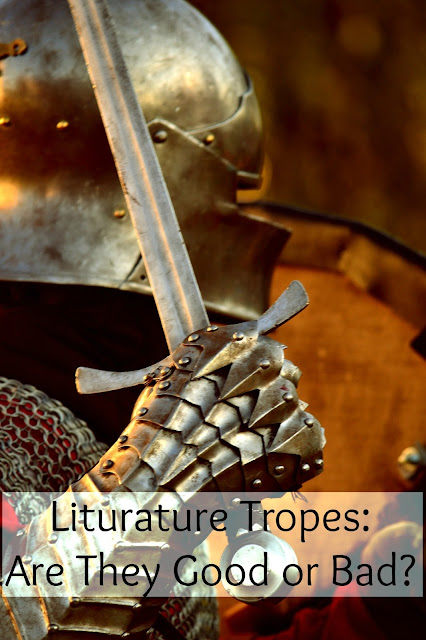Literature Tropes: Are They Good or Bad?
Boy falls in love with the girl next door. An unlikely hero must achieve the impossible. The humble farm boy is thrust into a world he doesn't understand. The tough warrior with the tragic backstory. What do all these have in common? Other than being found in YA novels.
They're all tropes. (And I'll discuss that term more in a minute.) You've seen these before. You look for them in some books and wish they weren't in others. Sometimes we enjoy them and sometimes we hate them.
Today I'm going to take a look at tropes in literature and whether or not writers should use them. Ready to get started?
Trope Definition
Dictionary.com defines a trope as "a word or expression used in a figurative sense" or "a common or overused theme or device". So it can either be a figure of speech, like a metaphor or hyperbole, or something similar to a cliche. In fact, the words trope and cliche are often used interchangeably. However, a trope is something commonly seen, whereas a cliche is something that has been used so many times, it's boring.
In this case, I'll be using the term trope to refer to something that's commonly seen in novels. Maybe another time I can do a similar post on cliches. Let's move on to whether tropes are good or bad.
To Use or Not to Use?
So a trope is something commonly seen in a novel, in this case. The question is, should writers avoid them or use them? The answer is, it depends on the trope. Some are perfectly fine, even excepted in a novel. Others verge on, or have become, cliche and should be avoided.
First you have to decided if something is a trope. The way to tell is if you've seen it enough times that it's become something you expect or look forward to. Like in a romantic movie, you expect two characters to fall in love with each other. Or you can tell that a story is going to be a Hero's Journey from the beginning. Those are tropes.
You have to be careful, though. As I said, over time some tropes have turned to cliches. If it's something you're tired of seeing, it's' probably a cliche. Those ones, like the Chosen One or love triangles, you can either avoid or turn into something new and fresh. The latter option is great if you can pull it off, as it makes readers think they know what's going to happen, but then you flip it on it's head.
Second, you should decided if your novel needs this particular trope. All genres have them, it's just part of novels. Sci-fi has space ships and aliens, fantasy has made-up worlds and magic, steampunk has gears, steam, and corsets. You just need to pick which ones will or won't work for your story.
Don't worry about using tropes for fear of not being original. Remember, everything has been written before. The reason your novel will be different will be because it was written by you. No one else can write that story the way you will. Go ahead and use that shape-shifting alien or boy falls in love with the girl next door and make it yours.
The one danger of using tropes and giving people what they expect is that readers will get bored. And we don't want that. When using a trope, think of ways to add a twist or go in a direction that readers won't expect. Keep readers on their toes. But don't go overboard either. You don't want to leave them dissatisfied because you never gave them that one thing they've been looking for since the beginning of the story (like a one-on-one confrontation with the antagonist).
As you can see, using tropes can be tricky, but they add to your novel. Like anything else, do what you think will work best for what you're writing.
Let's talk. What do you think about tropes? Should they be used, avoided, or changed? Tell me in the comments.



Comments
Post a Comment